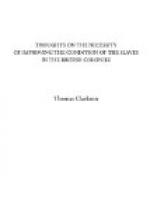I shall now conclude by saying, that I leave it; and that I recommend it, to others to add to the light which I have endeavoured to furnish on this subject, by collecting new facts relative to Emancipation and the result of it in other parts of the world, as well as relative to the superiority of free over servile labour, in order that the West Indians may be convinced, if possible, that they would be benefited by the change of system which I propose. They must already know, both by past and present experience, that the ways of unrighteousness are not profitable. Let them not doubt, when the Almighty has decreed the balance in favour of virtuous actions, that their efforts under the new system will work together for their good, so that their temporal redemption may be at hand.
THE END.
Printed by Richard Taylor, Shoe-Lane, London.
Footnotes:
[1] See Dickson’s Mitigation of Slavery, p. 18.
[2] See Dickson’s Mitigation of Slavery, p. 339.
[3] Mitigation of Slavery, p. 50.
[4] See Dickson’s Mitigation of Slavery, p. 102.
[5] A part of the black regiments were bought in Africa as recruits, and were not transported in slave-ships, and, never under West India masters: but it was only a small part compared with the whole number in the three cases.
[6] Memoire historique et politique des Colonies, et particulierement de celle de St. Domingue, &c. Paris, August 1814. 8vo. p. 58.
[7] Pp. 125, 126.
[8] There were occasionally marauding parties from the mountains, who pillaged in the plains; but these were the old insurgent, and not the emancipated Negroes.
[9] P. 78.
[10] Memoires, p. 311.
[11] Ibid. p. 324.
[12] The French were not the authors of tearing to pieces the Negroes alive by bloodhounds, or of suffocating them by hundreds at a time in the holds of ships, or of drowning them (whole cargoes) by scuttling and sinking the vessels;—but the planters.
[13] All the slave-population was to be emancipated in 18 years; and this consisted at the time of passing the decree of from 250,000 to 300,000 souls.
[14] See Dr. Dickson’s Mitigation of Slavery, London 1814, from whence every thing relating to this subject is taken. Dr. Dickson had been for many years secretary to Governor Hay, in Barbadoes, where he had an opportunity of studying the Slave agriculture as a system. Being in London afterwards when the Slave Trade controversy was going on in Parliament, he distinguished himself by silencing the different writers who defended the West Indian slavery. There it was that Mr. Steele addressed himself to him by letter, and sent him those invaluable papers, which the Doctor afterwards published under the modest title of “Mitigation of Slavery by Steele and Dickson.” No one was better qualified than Dr. Dickson to become the Editor of Mr. Steele.




